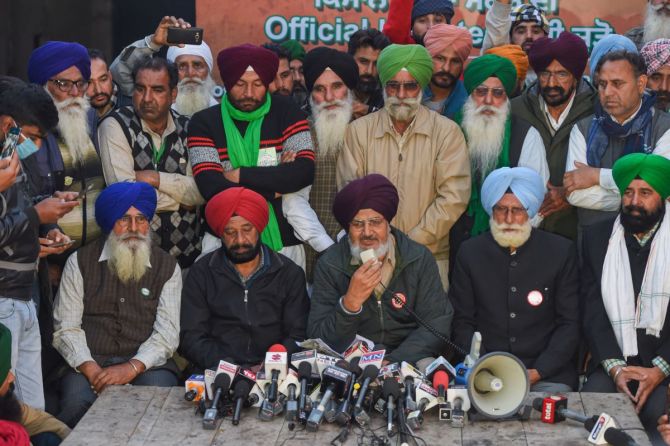The protesters should entrust the final judgement on the farm reform laws to the Supreme Court-mandated committee of experts and return to their villages, argues Virendra Kapoor.

In war, a good general knows when to advance, when to call a truce and when to retreat.
Instead of leading the troops to destruction, a wise commander prefers to fight another day, calling a ceasefire when the situation is still retrievable.
In the more than three-week-old standoff between the Punjab farmers and the government, the moment to call a truce and explore the possibility of a mutually agreed package of reforms is now.
The Supreme Court has provided the crucial opening to break the current impasse.
On December 17, the apex court suggested that the implementation of the new farm reforms be put on hold till these were examined afresh by an expert committee.
Though the government was non-committal, it is more than likely it may heed the apex court advice should the farmers agree to suspend the stir.
Neither side stands to gain from a prolonged and highly disruptive siege of the capital.
Instead of making it a grudge match between a government which, after decades of recommendations by multiple expert panels to reform the agri sector, finally acted upon them and the big Punjab-Haryana farmers with a vested interest in the highly flawed APMC system, the two sides should shun zidd (stubborness) and buy time for a mutually negotiated compromise.
That the Supreme Court-proposed committee would have independent experts as well as representatives of both the farmers and the government ought to lend its recommendations wider credibility.
A three-member bench headed by Chief Justice Sharad Arvind Bobde was hearing petitions seeking removal of farmers from roads at the borders of the capital.
Remarking that a protest is Constitutional till it does not cause loss of human life, destruction of property, or curb people's right to free movement, the court said it would send notices to the leaders of the farmers' unions.
The immediate concern of the court was the fundamental right of citizens to move freely.
The petitioners had contended that the protesters had blocked the free movement of vehicular traffic, an unlawful activity as per the SC order in the recent Shaheen Baug case.
The court had said that there should be a designated place for such protests so that normal life is not disturbed.
'Blocking Delhi may lead to people in the city going hungry. Farmers' purpose can be fulfilled by talking. Just sitting in protest wouldn't help,' the CJI remarked.
He added that the court hoped to facilitate a dialogue between the government and the farmers.
Thus, the ball was now in the farmers' court.
Given that the committee would include farmers' representatives besides independent farm experts, it should ordinarily persuade the farmers to suspend the protest.
Attorney General K K Venugopal was right to point out that farmers sitting together in large groups with none of them wearing face masks nor maintaining proper distance could spread the coronavirus on return to villages. 'Farmers cannot violate the fundamental rights of others,' Venugopal cautioned.
The current protest is dominated by relatively rich Punjab farmers who are net beneficiaries of the now unsustainable system of compulsory procurement of farm produce under the minimum support price mechanism.
A little over a million farmers of Punjab out of a total of over 160 million nation-wide have come to develop a deep vested interest in the near-compulsory procurement of paddy and wheat by the Food Corporation of India.
The result is that while the FCI groans under the unsustainable weight of four times the sanctioned requirement of minimum buffer stocks of wheat and rice, and as a result, suffers a huge financial haemorrhage, the Punjab farmer depletes the water table, degrades the soil with the overuse of highly subsidized chemicals and bleeds the exchequer through misuse of free water and electricity.
Anyone who specialises in the farm economy would be untrue to his craft if he were to endorse the current agitation for the continuance of the status quo on the present crop pattern primarily in Punjab and Haryana.
This was the considered view of the present Opposition parties while they were in power.
From Rahul Gandhi to Sharad Pawar, from Amarinder Singh to Arvind Kejriwal, all had committed to dismantle the APMC system and open up the farm sector to private investment, contract farming, nation-wide market, e-platforms, unhindered export of farm produce, etc.
An all-party parliamentary committee of the agriculture ministry in December 2019 called the APMC mandis as a hotbed of politics and corruption, cartelisation, defrauding of farmers etc, and recommended the abrogation of the APMC Act.
If the Supreme Court-mandated committee of experts succeeds in instilling change and progress in farm practices in the erstwhile food bowl of the nation it would benefit both the Punjab-Haryana farmers and the nation as a whole.
The protesters should entrust the final judgement on the farm reform laws to the experts and go back to their villages.
Feature Presentation: Aslam Hunani/Rediff.com










